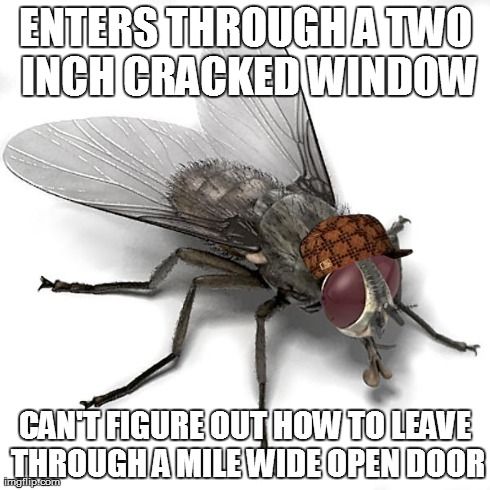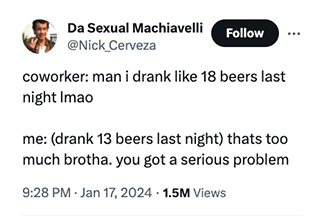10 Answers To Questions You Always Wondered About
Nathan Johnson
Published
10/10/2015
in
ftw
Interesting answers to important questions.
- List View
- Player View
- Grid View
Advertisement
-
1.
 Why is it so much harder to gain muscle than lose it? Because muscle is expensive for your body. Muscle needs fuel-it needs calories/energy to function, and it needs a lot of it. But your body only needs a set amount of muscle, and anything beyond that point is waste. Your body still thinks food is scarce and every day is a fight for survival. Why would it keep on extra muscle when muscle is both expensive and unneeded? Fat on the other hand, serves as protection/backup and spends a lot les energy than muscle, thus why your body wants to keep it/keep making it. That’s why you need to ‘trick’ your body into thinking it ‘needs’ that extra muscle, by engaging in resistance training and feeding it adequate supply of energy.
Why is it so much harder to gain muscle than lose it? Because muscle is expensive for your body. Muscle needs fuel-it needs calories/energy to function, and it needs a lot of it. But your body only needs a set amount of muscle, and anything beyond that point is waste. Your body still thinks food is scarce and every day is a fight for survival. Why would it keep on extra muscle when muscle is both expensive and unneeded? Fat on the other hand, serves as protection/backup and spends a lot les energy than muscle, thus why your body wants to keep it/keep making it. That’s why you need to ‘trick’ your body into thinking it ‘needs’ that extra muscle, by engaging in resistance training and feeding it adequate supply of energy. -
2.
 Why does America have so many people in jail? One reason is because a nice easy platform to run on for elections is to “get tough on crime.” The form this comes in is more things being illegal, especially drugs, mandatory sentencing, so people don’t “get off easy” and things like the Three Strikes Law. The concept as far as I can tell on the Three Strikes Law is that someone who commits a third felony is a “career criminal” aka a broken worthless member of society who only causes problems and should be locked away for the rest of their lives for the safety of others. “Getting tough on crime” also causes the problem of trying to pull back those laws. If a politician were wanting to make sentencing lighter, his/her political opponent could say they were “soft on crime” and would put voters in danger since a lighter sentence means less deterrence. What they fail to say is that harsh sentences hardly work as a deterrence. To many people, the risk vs reward, the reward always wins out, either not considering the possible sentencing when buying weed, or thinking they’re smarter than those other burglars who just weren’t good enough to not get caught. Finally, as others have said, there are private prisons. If you believe that politicians are immoral enough to purposely create laws intended to imprison people to increase the paychecks of private prison owners and get a “donation” as a reward, making more things illegal to create more prisoners would make sense. While I believe this is the case for several politicians, I think some are just ignorant about the facts on deterrence and honestly believe having harsher sentences will make people stop breaking the law.
Why does America have so many people in jail? One reason is because a nice easy platform to run on for elections is to “get tough on crime.” The form this comes in is more things being illegal, especially drugs, mandatory sentencing, so people don’t “get off easy” and things like the Three Strikes Law. The concept as far as I can tell on the Three Strikes Law is that someone who commits a third felony is a “career criminal” aka a broken worthless member of society who only causes problems and should be locked away for the rest of their lives for the safety of others. “Getting tough on crime” also causes the problem of trying to pull back those laws. If a politician were wanting to make sentencing lighter, his/her political opponent could say they were “soft on crime” and would put voters in danger since a lighter sentence means less deterrence. What they fail to say is that harsh sentences hardly work as a deterrence. To many people, the risk vs reward, the reward always wins out, either not considering the possible sentencing when buying weed, or thinking they’re smarter than those other burglars who just weren’t good enough to not get caught. Finally, as others have said, there are private prisons. If you believe that politicians are immoral enough to purposely create laws intended to imprison people to increase the paychecks of private prison owners and get a “donation” as a reward, making more things illegal to create more prisoners would make sense. While I believe this is the case for several politicians, I think some are just ignorant about the facts on deterrence and honestly believe having harsher sentences will make people stop breaking the law. -
3.
 Why do cats like boxes so much? Cats are ambush predators. They like to lie in wait, hidden, and leap out at prey. So small enclosed spaces from which a cat can watch while being harder to see are awesome. It’s also why they like high places, like the tops of fridges or cupboards, because again it simulates the effect of seeing without being seen.
Why do cats like boxes so much? Cats are ambush predators. They like to lie in wait, hidden, and leap out at prey. So small enclosed spaces from which a cat can watch while being harder to see are awesome. It’s also why they like high places, like the tops of fridges or cupboards, because again it simulates the effect of seeing without being seen. -
4.
 When defusing a bomb, would you actually need to cut a specific wire instead of all of them? If a wire is providing input to a NOT gate, then “on” turns to “off”. So by clipping a wire, you could be preventing the signal that keeps the bomb from exploding. Most bombs are not built with the intention of being found, and as such, they’re going to hastily be slapped together. If you clipped all the wires, you’d probably be okay. Hollywood has deeply ingrained this concept of impossible-to-disarm bombs. That said, a bomb in plain sight is terrifying for a bomb technician since it means it may have really been made to go off while trying to be disarmed.
When defusing a bomb, would you actually need to cut a specific wire instead of all of them? If a wire is providing input to a NOT gate, then “on” turns to “off”. So by clipping a wire, you could be preventing the signal that keeps the bomb from exploding. Most bombs are not built with the intention of being found, and as such, they’re going to hastily be slapped together. If you clipped all the wires, you’d probably be okay. Hollywood has deeply ingrained this concept of impossible-to-disarm bombs. That said, a bomb in plain sight is terrifying for a bomb technician since it means it may have really been made to go off while trying to be disarmed. -
5.
 How can I sleep for 6 hours and feel refreshed, but sleep for 10 and still feel tired? Your brain goes through different cycles when you sleep. When you try and wake up in the middle of a cycle, you get something called ‘sleep inertia’ where your body wants to continue on to the end of the cycle instead of getting up, making you feel tired. Usually these cycles last about an hour and a half, which is why at the end of 6 hours you’ll wake up at the end of a cycle feeling refreshed and awake, but at 10 hours you’ll wake up in the middle of a cycle and be sleepy. There’s a really cool website that you can use to help you wake up at a time that won’t make you feel tired. It uses the average time it takes to fall asleep and how long the average sleep cycle is and spits out a bunch of times you can fall asleep/wake up at that match up with your sleep cycles.
How can I sleep for 6 hours and feel refreshed, but sleep for 10 and still feel tired? Your brain goes through different cycles when you sleep. When you try and wake up in the middle of a cycle, you get something called ‘sleep inertia’ where your body wants to continue on to the end of the cycle instead of getting up, making you feel tired. Usually these cycles last about an hour and a half, which is why at the end of 6 hours you’ll wake up at the end of a cycle feeling refreshed and awake, but at 10 hours you’ll wake up in the middle of a cycle and be sleepy. There’s a really cool website that you can use to help you wake up at a time that won’t make you feel tired. It uses the average time it takes to fall asleep and how long the average sleep cycle is and spits out a bunch of times you can fall asleep/wake up at that match up with your sleep cycles. -
6.
 How did computer languages, like C++ and binary, even get made? How does the computer even understand it? And since people made them, couldn’t they have made it easier? Transistors were first invented for signal amplification; a little current proportionately controls the flow of a large standing current. Coincidentally, it can also thus be used as a switch, where the little current turns on or off the large current. Digital computers don’t care about matters of degree, only whether the circuit is open or closed, thus, we abstract the reality with 0 or 1. Computers don’t care about numbers, they’re electrical machines, these abstractions are for the humans. Transistors can be arranged into Logic Gates, of which there is the AND, OR, NOT, and XOR. Look them up. For their inputs, whether they’re on or not determines the output. Don’t worry about the physical implementation – that requires transistors, resistors, diodes, standby power, and so forth; at this point, we only care about the gate as a unit of computation and 0 and 1 as inputs and outputs. Gates can be arranged to make flip-flop and half adder circuits. Look those up, they’re pretty straight forward. Adders can be stacked to make full adders, by which they can add two integers of some arbitrary number of bits. You’re going to have to learn binary addition and conversion from binary to decimal to really get what’s going on, but it’s very simple and should take you less than 5 minutes. Go look. And notice that if you want to add two 8 bit integers, you need two sets of inputs, 8 inputs for each integer, one input for each significant bit for each. Welcome to the concept of a “bus”, a bunch of wires that move data from one component to another. They exist within your CPU, and they exist across your computer. There’s a memory bus, an IDE bus, which is what all your expansion cards plug into, there’s an SATA bus, which is what your hard drive plugs into, there’s USB or Universal Serial Bus… So if you want your computer to be able to add, it needs the physical circuitry to actually add. If you want your computer to subtract, multiply, divide… You need circuit paths for each one (sort of). Truth be told, you can do compute anything with very little (called Turing Complete), but computers will have dedicated circuits for common tasks that it could otherwise do with the use of it’s simpler circuits. This is called hardware acceleration. So you have all these circuit paths to do a bunch of simple computations, now you need to tell the computer what paths your data should go down, so the right computation can happen. A sort of traffic controller. If you give each circuit path a unique number to identify it, you can call those numbers opcodes. A series of opcodes is the same thing as a program. Languages like C++ are text files that a program, called a compiler, can turn into a symbolic representation, and them mathematically reason about it’s structure. It all breaks down to a series of simple computations, and the output is a stream of opcodes.
How did computer languages, like C++ and binary, even get made? How does the computer even understand it? And since people made them, couldn’t they have made it easier? Transistors were first invented for signal amplification; a little current proportionately controls the flow of a large standing current. Coincidentally, it can also thus be used as a switch, where the little current turns on or off the large current. Digital computers don’t care about matters of degree, only whether the circuit is open or closed, thus, we abstract the reality with 0 or 1. Computers don’t care about numbers, they’re electrical machines, these abstractions are for the humans. Transistors can be arranged into Logic Gates, of which there is the AND, OR, NOT, and XOR. Look them up. For their inputs, whether they’re on or not determines the output. Don’t worry about the physical implementation – that requires transistors, resistors, diodes, standby power, and so forth; at this point, we only care about the gate as a unit of computation and 0 and 1 as inputs and outputs. Gates can be arranged to make flip-flop and half adder circuits. Look those up, they’re pretty straight forward. Adders can be stacked to make full adders, by which they can add two integers of some arbitrary number of bits. You’re going to have to learn binary addition and conversion from binary to decimal to really get what’s going on, but it’s very simple and should take you less than 5 minutes. Go look. And notice that if you want to add two 8 bit integers, you need two sets of inputs, 8 inputs for each integer, one input for each significant bit for each. Welcome to the concept of a “bus”, a bunch of wires that move data from one component to another. They exist within your CPU, and they exist across your computer. There’s a memory bus, an IDE bus, which is what all your expansion cards plug into, there’s an SATA bus, which is what your hard drive plugs into, there’s USB or Universal Serial Bus… So if you want your computer to be able to add, it needs the physical circuitry to actually add. If you want your computer to subtract, multiply, divide… You need circuit paths for each one (sort of). Truth be told, you can do compute anything with very little (called Turing Complete), but computers will have dedicated circuits for common tasks that it could otherwise do with the use of it’s simpler circuits. This is called hardware acceleration. So you have all these circuit paths to do a bunch of simple computations, now you need to tell the computer what paths your data should go down, so the right computation can happen. A sort of traffic controller. If you give each circuit path a unique number to identify it, you can call those numbers opcodes. A series of opcodes is the same thing as a program. Languages like C++ are text files that a program, called a compiler, can turn into a symbolic representation, and them mathematically reason about it’s structure. It all breaks down to a series of simple computations, and the output is a stream of opcodes. -
7.
 How come flies and other bugs can so easily get into my house through a small crack in the window but then freak the fuck out and aimlessly fly at the glass trying to get out? Flies and other insects are attracted to the carbon dioxide your body gives off, along with the smells of food and other household byproducts. This mixture of gasses flows out of the cracks in your house and gives the insects something to track down. When they’re trying to leave, there’s nothing attracting them out, so they’re just trying to follow the light and nothing else. Insects aren’t intelligent enough to understand windows, so they stupidly bounce off over and over.
How come flies and other bugs can so easily get into my house through a small crack in the window but then freak the fuck out and aimlessly fly at the glass trying to get out? Flies and other insects are attracted to the carbon dioxide your body gives off, along with the smells of food and other household byproducts. This mixture of gasses flows out of the cracks in your house and gives the insects something to track down. When they’re trying to leave, there’s nothing attracting them out, so they’re just trying to follow the light and nothing else. Insects aren’t intelligent enough to understand windows, so they stupidly bounce off over and over. -
8.
 Why do secret service wear suits and ties when if they need to run, move quickly, or do anything else that seems like the most restrictive attire? When the Secret Service began protecting the President, the decision was made for them to wear formal attire instead of military-style clothing for image purposes. They didn’t want to give the appearance of some military dictator surrounded by armed troops, so they made the agents close by the President as unobtrusive as possible. That being said, the Secret Service does have a Uniformed Division that wears tactical gear and has more powerful weapons. If the President makes a public speech, for example, they’ll be on rooftops with sniper rifles and binoculars, while the guys in suits will be next to the President.
Why do secret service wear suits and ties when if they need to run, move quickly, or do anything else that seems like the most restrictive attire? When the Secret Service began protecting the President, the decision was made for them to wear formal attire instead of military-style clothing for image purposes. They didn’t want to give the appearance of some military dictator surrounded by armed troops, so they made the agents close by the President as unobtrusive as possible. That being said, the Secret Service does have a Uniformed Division that wears tactical gear and has more powerful weapons. If the President makes a public speech, for example, they’ll be on rooftops with sniper rifles and binoculars, while the guys in suits will be next to the President. -
9.
 I’m 70 years old, only got a few years left, what’s stopping me from spending a lot of money and racking up a load of debt? Most older people want to leave money to their families, especially their kids. If you die with a huge debt, they get nothing, and all of your property (including your family home) will get sold to pay your debt.
I’m 70 years old, only got a few years left, what’s stopping me from spending a lot of money and racking up a load of debt? Most older people want to leave money to their families, especially their kids. If you die with a huge debt, they get nothing, and all of your property (including your family home) will get sold to pay your debt. -
10.
 Why do most females I know will feel embarrassed if you see them in a bra and underwear but act totally cool in a bikini? Consent. If you catch someone off guard while they’re in their underwear, they gave you no consent to look at them while wearing underwear, so they’re either embarrassed or tell you to leave. Whereas with a bikini, the wearer is giving you and everybody else the permission to look at them. Same thing applies to swim shorts/boxers.
Why do most females I know will feel embarrassed if you see them in a bra and underwear but act totally cool in a bikini? Consent. If you catch someone off guard while they’re in their underwear, they gave you no consent to look at them while wearing underwear, so they’re either embarrassed or tell you to leave. Whereas with a bikini, the wearer is giving you and everybody else the permission to look at them. Same thing applies to swim shorts/boxers.
- NEXT GALLERY
-

- 33 Awesome Pics For A Great Day
Why is it so much harder to gain muscle than lose it? Because muscle is expensive for your body. Muscle needs fuel-it needs calories/energy to function, and it needs a lot of it. But your body only needs a set amount of muscle, and anything beyond that point is waste. Your body still thinks food is scarce and every day is a fight for survival. Why would it keep on extra muscle when muscle is both expensive and unneeded? Fat on the other hand, serves as protection/backup and spends a lot les energy than muscle, thus why your body wants to keep it/keep making it. That’s why you need to ‘trick’ your body into thinking it ‘needs’ that extra muscle, by engaging in resistance training and feeding it adequate supply of energy.
10/10
1/10








64 Comments